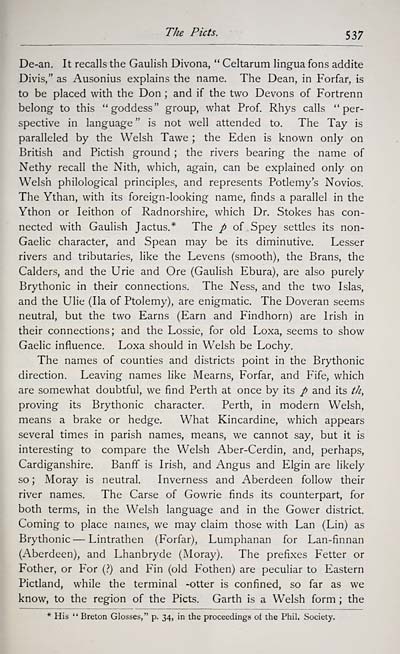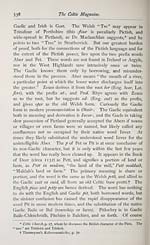Blair Collection > Celtic magazine > Volume 12
(547)
Download files
Complete book:
Individual page:
Thumbnail gallery: Grid view | List view

The Picts.
537
De-an. It recalls the Gaulish Divona, " Celtarum lingua fons addite
Divis," as Ausonius explains the name. The Dean, in Forfar, is
to be placed with the Don ; and if the two Devons of Fortrenn
belong- to this "goddess" group, what Prof. Rhys calls "per-
spective in language " is not well attended to. The Tay is
paralleled by the Welsh Tawe ; the Eden is known only on
British and Pictish ground ; the rivers bearing the name of
Nethy recall the Nith, which, again, can be explained only on
Welsh philological principles, and represents Potlemy's Novios.
The Ythan, with its foreign-looking name, finds a parallel in the
Ython or leithon of Radnorshire, which Dr. Stokes has con-
nected with Gaulish Jactus.* The p of Spey settles its non-
Gaelic character, and Spean may be its diminutive. Lesser
rivers and tributaries, like the Levens (smooth), the Brans, the
Calders, and the Urie and Ore (Gaulish Ebura), are also purely
Brythonic in their connections. The Ness, and the two Islas,
and the Ulie (Ila of Ptolemy), are enigmatic. The Doveran seems
neutral, but the two Earns (Earn and Findhorn) are Irish in
their connections; and the Lossie, for old Loxa, seems to show
Gaelic influence. Loxa should in Welsh be Lochy.
The names of counties and districts point in the Brythonic
direction. Leaving names like Mearns, Forfar, and Fife, which
are somewhat doubtful, we find Perth at once by its / and its tJi,
proving its Brythonic character. Perth, in modern Welsh,
means a brake or hedge. What Kincardine, which appears
several times in parish names, means, we cannot say, but it is
interesting to compare the Welsh Aber-Cerdin, and, perhaps,
Cardiganshire. Banff is Irish, and Angus and Elgin are likely
so ; Moray is neutral. Inverness and Aberdeen follow their
river names. The Carse of Gowrie finds its counterpart, for
both terms, in the Welsh language and in the Gower district.
Coming to place names, we may claim those with Lan (Lin) as
Brythonic — Lintrathen (Forfar), Lumphanan for Lan-finnan
(Aberdeen), and Lhanbryde (Moray). The prefixes Fetter or
Fother, or For (.^) and Fin (old Fothen) are peculiar to Eastern
Pictland, while the terminal -otter is confined, so far as we
know, to the region of the Picts. Garth is a Welsh form ; the
* His " Breton Glosses," p. 34, in the proceedings of the Phil. Society.
537
De-an. It recalls the Gaulish Divona, " Celtarum lingua fons addite
Divis," as Ausonius explains the name. The Dean, in Forfar, is
to be placed with the Don ; and if the two Devons of Fortrenn
belong- to this "goddess" group, what Prof. Rhys calls "per-
spective in language " is not well attended to. The Tay is
paralleled by the Welsh Tawe ; the Eden is known only on
British and Pictish ground ; the rivers bearing the name of
Nethy recall the Nith, which, again, can be explained only on
Welsh philological principles, and represents Potlemy's Novios.
The Ythan, with its foreign-looking name, finds a parallel in the
Ython or leithon of Radnorshire, which Dr. Stokes has con-
nected with Gaulish Jactus.* The p of Spey settles its non-
Gaelic character, and Spean may be its diminutive. Lesser
rivers and tributaries, like the Levens (smooth), the Brans, the
Calders, and the Urie and Ore (Gaulish Ebura), are also purely
Brythonic in their connections. The Ness, and the two Islas,
and the Ulie (Ila of Ptolemy), are enigmatic. The Doveran seems
neutral, but the two Earns (Earn and Findhorn) are Irish in
their connections; and the Lossie, for old Loxa, seems to show
Gaelic influence. Loxa should in Welsh be Lochy.
The names of counties and districts point in the Brythonic
direction. Leaving names like Mearns, Forfar, and Fife, which
are somewhat doubtful, we find Perth at once by its / and its tJi,
proving its Brythonic character. Perth, in modern Welsh,
means a brake or hedge. What Kincardine, which appears
several times in parish names, means, we cannot say, but it is
interesting to compare the Welsh Aber-Cerdin, and, perhaps,
Cardiganshire. Banff is Irish, and Angus and Elgin are likely
so ; Moray is neutral. Inverness and Aberdeen follow their
river names. The Carse of Gowrie finds its counterpart, for
both terms, in the Welsh language and in the Gower district.
Coming to place names, we may claim those with Lan (Lin) as
Brythonic — Lintrathen (Forfar), Lumphanan for Lan-finnan
(Aberdeen), and Lhanbryde (Moray). The prefixes Fetter or
Fother, or For (.^) and Fin (old Fothen) are peculiar to Eastern
Pictland, while the terminal -otter is confined, so far as we
know, to the region of the Picts. Garth is a Welsh form ; the
* His " Breton Glosses," p. 34, in the proceedings of the Phil. Society.
Set display mode to: Large image | Transcription
Images and transcriptions on this page, including medium image downloads, may be used under the Creative Commons Attribution 4.0 International Licence unless otherwise stated. ![]()
| Early Gaelic Book Collections > Blair Collection > Celtic magazine > Volume 12 > (547) |
|---|
| Permanent URL | https://digital.nls.uk/76467047 |
|---|
| Description | Volume XII, 1887. |
|---|---|
| Shelfmark | Blair.13 |
| Attribution and copyright: |
|
| Description | A selection of books from a collection of more than 500 titles, mostly on religious and literary topics. Also includes some material dealing with other Celtic languages and societies. Collection created towards the end of the 19th century by Lady Evelyn Stewart Murray. |
|---|
| Description | Selected items from five 'Special and Named Printed Collections'. Includes books in Gaelic and other Celtic languages, works about the Gaels, their languages, literature, culture and history. |
|---|

